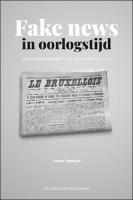Fake news in oorlogstijd
Duitse mediamanipulatie en de Flamenpolitik (1914-1915)
Abstract
During the First World War, the German occupier tried to split Belgium internally. This was done by pursuing a Flamenpolitik, a policy aimed at scaring the Flemish, or at least the Flemish movement, against Belgium. That worked, because a small number of Flemish supporters, the so-called activists, did indeed collaborate. From the late summer of 1914, Berlin in the occupied country would incessantly bombard the Flemish movement with a large-scale media campaign. The German services, supported by their Austrian allies, mainly made use of pamphlets and the written press, not only in Belgium but also in the neutral Netherlands. In the summer of 1915 activism was a fact: an anti-Belgian Flemish nationalism, the consequences of which have been felt to date, had seen the light of day. The propaganda underlying it was so ingenious and clever that it not only convinced contemporaries, but still misleads historians even more than a century later. It is a fine example of “fake news” avant la lettre. Tijdens de Eerste Wereldoorlog probeerde de Duitse bezetter België intern te splijten. Dat gebeurde door het voeren van een Flamenpolitik, een beleid dat erop gericht was de Vlamingen of in elk geval de Vlaamse beweging in het harnas te jagen tegen België. Dat lukte, want een klein deel Vlaamsgezinden, de zogenaamde activisten, collaboreerde inderdaad. Vanaf de nazomer van 1914 zou Berlijn in het bezette land de Vlaamse beweging onophoudelijk bestoken met een grootscheepse mediacampagne. De Duitse diensten, gesteund door hun Oostenrijkse bondgenoten, maakten daarbij vooral gebruik van vlugschriften en de geschreven pers, niet alleen in België maar ook in het neutrale Nederland. In de zomer van 1915 was het activisme een feit: een anti-Belgisch Vlaams-nationalisme, waarvan de gevolgen tot op heden voelbaar zijn, had het daglicht gezien. De propaganda die eraan ten grondslag lag was zó vernuftig en ingenieus dat ze niet alleen tijdgenoten overtuigde, maar zelfs meer dan een eeuw later nog steeds historici misleidt. Het is een mooi staaltje van “fake news” avant la lettre.
Keywords
Flamenpolitik;Propaganda;Fake news;Activisme;Eerste Wereldoorlog;Nationalisme;Groot-Nederland;Frontbeweging;Völkisch; first world warDOI
10.11116/9789461663788ISBN
9789462702707, 9789461663795, 9789461663788Publisher
Leuven University PressPublisher website
https://lup.be/Publication date and place
Leuven, 2021Grantor
Classification
Local history
First World War
c 1914 to c 1918 (World War One period)
Media studies


 Download
Download Web Shop
Web Shop